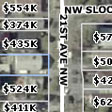
Not at all, argues Alan Durning in his recent essay on freedom and property values. Rather, Cascadians understand how our individual freedom is protected by democratic standards.
Just look at Zillow.com, the property value website where you can see your home as part of the network of your neighborhood. Looking your home up is a clear reminder that what your neighbor does affects the value of your property. And that’s just the beginning of how we are interconnected.








Arie v.
According to the county assessors office our (rural KC) land value increased by 50% last year and neighbors in our neighborhood saw similar increases. Regulations such as the CAO play a role in that, but I’m not sure it’s all positive.Propery value increases are a double edged sword due to taxes and affordability. Also the percentage of property value increase that is due to regulation is something that is widely debated and should be part of the calculus of growth management.Should our rural neighborhoods become enclaves for the wealthy? Is controlling the cost of regulation also a goal or a necessary evil? I recently noticed that my septic plan would cost half as much were I 15 minutes to the north in Snohomixh county. 🙂 http://www.ammansepticdesigns.com/
Dan
Also the percentage of property value increase that is due to regulation is something that is widely debated and should be part of the calculus of growth management. I don’t know of any empirical models that can do a good job of forecasting rent increases as a result of policy action – certainly nowhere near well enough to address compensation. Nor do I know of any that can handle the complex interactions that happen in WA, esp. wrt folk demanding compensation. What the outside-the-UGBers want is redress for their lost opportunity costs. That’s fine and I don’t disagree. We all understand that, but personally I think that calculus is a non-starter, sorry. And the national-level regulatory takings bills died in 109th’s last session. I’m not sure the will’s there to address the minority regulatory taking wrongs. Anyway, for the rest of the folks here, this paper is an interesting addition to the literature. It finds that there are more social interactions in suburbia than in dense cities. I certainly find that to be true out here [exurbia], as folks self-select to this area. Whether it holds true for inner-ring suburbs subject to migration is still open.DS
Arie v.
This is more like ex-exurbia and we’re finding the social ties here are pretty tight as well, but some of that comes from the roots folks lay down. Urban folks are more transient, especially with the higher percentages of renters. I wonder if some of the older urban neighborhoods don’t do as well as the rest of us. I normally take the rural perspective, but I doubt there can be a strong case for regulatory takings across the board. Albeit there are winners and losers. Eric had it mostly right in his regulatory “givings” post a while back. What I can say is that land is becoming dearer – especially that which isn’t hampered by critical areas or other regulatory concerns. Developing it is also becoming costlier due to regulation and with the demand high, especially for close in rural neighborhoods like ours, prices are soaring. As a result we’re losing our working class neighbors. My parents couldn’t have lived here.
Dan
I agree Arie. On another board, I brought this givings thing up with one of the big name libertarian proselytizers, and he had no answer, because there is none. You need regulation to preserve common goods, but you need to make sure you don’t screw somebody too. In landscapes ~1 hr from a CBD, decisions have already been made; that is: folks are going to sell this land (to retire, speculation, developers). In landscapes ~ 2 hrs from a CBD, plans have already been made. When we regulate greater than 1 hr from a CBD, we impinge upon those plans. How we fix that is a function of political will, and I don’t see anyone stepping up to the plate, esp. out here; our local Rep still thinks its a good idea to cap my property tax rate increase at 1% and told me he’s going to vote for it – I told him thanks a lot, that’ll put me 2% behind inflation (he doesn’t quite get it). Point being not too many good ideas floating out there right now. What will be interesting is what land use will be like in, say, 2050. Then, we’ll likely have 1M more people in the Puget Sound area and 400M in the US – I wonder what migration and food prices will be like, and how dear that open land will be so we can have locally-grown food…
Arie v.
Thanks to globalization and modern transportation, land for food will most likely be found in poorer countries regardless of whether it is needed for less profitable purposes like housing. Supply and demand…For better news look to a country like The Netherlands. Visiting relatives there I’m amazed how much farmland remains despite the density. Over 16 million people in a country about the size of the Olympic Peninsula and yet an admirable standard of living.
Dan
I, personally, wonder if we are going to have globalized food production and distribution in 2050. It depends upon what petroleum-dependent sector we eliminate: food, material, transportation. And you see that food is dependent upon transportation, so there’s the difficulty.